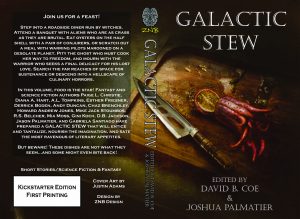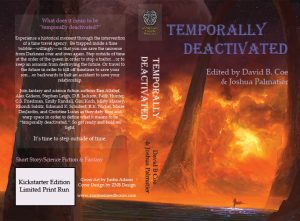 What is the difference between an idea and a story? It sounds like a basic question, but we have just begun the Zombies Need Brains Kickstarter for the coming year’s anthologies, and once again I am hoping to co-edit one of the collections. (This year, I co-edited the Galactic Stew anthology; last year it was Temporally Deactivated. I also had stories in both, writing as D.B. Jackson.) In past years, one of the most common issues we have found with submitted stories is that they fail to move beyond being an idea. They introduce a concept, often an intriguing one. But that is all they do.
What is the difference between an idea and a story? It sounds like a basic question, but we have just begun the Zombies Need Brains Kickstarter for the coming year’s anthologies, and once again I am hoping to co-edit one of the collections. (This year, I co-edited the Galactic Stew anthology; last year it was Temporally Deactivated. I also had stories in both, writing as D.B. Jackson.) In past years, one of the most common issues we have found with submitted stories is that they fail to move beyond being an idea. They introduce a concept, often an intriguing one. But that is all they do.
Hence today’s post.
 I have touched on the subject of creative ideas in other Writing-Tip Wednesday posts this year (here and here), and I have also spent a bit of time on tips for short fiction writers (here). Today, though, I would like delve in a bit deeper, in order to spell out what distinguishes a story from a partially developed idea.
I have touched on the subject of creative ideas in other Writing-Tip Wednesday posts this year (here and here), and I have also spent a bit of time on tips for short fiction writers (here). Today, though, I would like delve in a bit deeper, in order to spell out what distinguishes a story from a partially developed idea.
Let me begin with this: Every successful fictional story blossomed from an idea. Not every idea yields a story. That’s just fact. Some of the “best” ideas I’ve had kind of fizzled out before becoming anything close to a story. I find this frustrating of course. I expect all writers must. But, as I say, it’s simply the way it is. Some ideas “have legs,” while others don’t.
The problem comes when we write an idea and submit it as a story. Not to be too simplistic, but a story has a beginning, middle, and end. It involves characters and emotion, and it carries those characters through changes that a reader can trace. Too often when reading through submissions for past anthologies, I have encountered pieces that introduce a concept and a set of characters, but do no more than that.
Let’s take a for instance: The theme for this next anthology I’ll be co-editing is “Derelict.” We are looking for stories about abandoned or wrecked ships, be they sailing vessels, spacecraft, or something else that we haven’t even considered. Someone might come up with an idea for, say, a haunted shipwreck (and I would urge you to look beyond this for an idea — we are going to get LOTS of haunted shipwreck stories) that traps the unwitting and makes them permanent members of the ghost crew still onboard. Cool idea, right? But what are we going to do with that idea? It’s not enough simply to show us a character being ensnared in this way. That is no more than an illustration of the idea.
It becomes a story when we follow a character through that transformation in a way that dips into emotion and creates a true character arc. Perhaps an elderly woman has come to an island from which her grandfather once sailed a hundred years before. She was estranged from her parents while they were alive, and has lost her siblings to age and disease. She seeks some connection to the family she has lost. Knowing that her great grandfather died here on the island in a storm a century ago, she goes out to the site of the wreck. While there, she realizes that ghosts still inhabit the ship, and venturing closer, she sees a man she recognizes from ancient family photos or portraits. She makes contact with him, but that isn’t enough for her. In the end, she chooses to join that crew and become a wraith like her grandfather, seeking in that ghostly partnership solace for all she lost in life. THAT would be a story. (In fact, maybe that will be my story for the anthology…) We have taken an idea and turned it into a narrative that has emotional weight, that allows our point of view character to develop and progress.
Coming up with the idea is only step one in a far more complex process. We want to think of the most unusual, emotionally potent way to express that idea. And, I would add that this is not something we can usually do in five hundred words, or a thousand, or even two thousand. I don’t like to say that word count is essential to a story, but the fact is true flash fiction is VERY hard to do well, particularly with intriguing speculative fiction ideas. It CAN be done, of course. But generally speaking, full development of an idea for a themed anthology — into a story that touches on emotion, that traces a meaningful arc for our main character or characters — demands that we write more than a couple of pages.
I would urge you to think about this as August gives way to September, and the open call for the Zombies Need Brains anthologies approaches. In the meantime, the Kickstarter is well underway. In our first week, we have already funded well beyond the halfway mark, which bodes well for the ultimate success of the campaign. But please consider helping us out. We have a great roster of anchor authors, and our list of authors chosen from open submissions could include you!
Best of luck, and keep writing.








